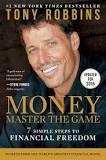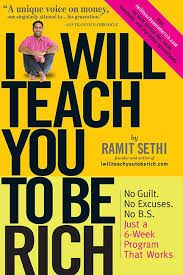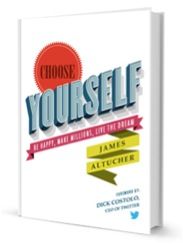Every 6 months to a year, I find myself in a rut…
I feel like I’m stagnating, and get antsy, wondering where the hell am I doing with my time here; some of these times I don’t do anything about it.
Well, except maybe open a bottle of wine. Or push whatever urge to the land of ‘later’, or ‘tomorrow’. Which is code for NEVER. Screw never.
But those other times, when I get to the point of self-loathing – I … read.
So I’ve decided to have a sort of rolling stack of books that I want my brain to ingest. Rolling as in – it changes over time. A lot. Also, writing down the summary of each book has its merits.
Maybe some will find it useful.
Or maybe not.
I do it for my own benefit anyway. Turns out my brain seems to hold on to information better if I write stuff down.
Here goes nothing. Otherwise known as – what I retained from these books:
Tony Robbins – Money – Master the game
- Decide if you want some money
- do you even invest, bro? if not, you should be
- stay the hell away from stocks; go for lowest cost indexes that mimic the rich folks
- automate to invest part of your income/revenue
- take advantage of your employer matching
- Become the insider (know the rules of the game; yes! it is a game)
- know the myths of investing (it’s all a hoax, 99% of funds fail you, but they gain anyway)
- fees, lowest possible; 1% or 3% fees is a whole world of difference
- advertised vs actual returns
- broker vs fiduciary
- 401k
- must you risk big to win big? of course not
- don’t invest emotionally (change your portfolio when logic dictates it)
- Make the game winnable
- figure out your number
- run the math on conservative, neutral, aggressive investing calculators
- speed it up:
- save more
- earn more
- less fees and taxes
- get better returns
- consider (cheaper) location
- Investment decisions
- asset allocation
- create various buckets of investments (dream, risk/growth, security)
- eval your risk tolerance effectively
- figure out how to fund your dream bucket
- rebalancing and dollar cost averaging
- all season investing plan
- Ray Dalio example
- immediate vs deferred annuity
- ‘guaranteed lifetime income plan’?
- tax efficiency
- setup living trust to protect you & family during downturns
- invest like the .001%
- digest the interviews of the 12 smartest finance people
- how to emulate the best investor
- Ray Dalio, Paul Tudor Jones, Warren Buffet, Jack Bogle
- bonus:
- hope for the future
- gratefulness like you already are super wealthy
- commit to progress
- think about your own legacy
- secret to living is giving
Ramit Sethi – I will teach you to be rich
One of the more solid books in personal finance, with Ramit’s usual no BS, super practical approach to handling your money. The book is split into ‘weeks’ which are conveniently chapters, and you’ll learn about:
- banks
- credit cards
- investing
- budgeting
- automation
I was thrilled to conclude that on a personal level, I was already intuitively applying most of the good stuff in this book, which is why it definitely made my top 10 books on the topic.
James Altucher – Choose yourself
James is an omnipresent thought-leader in a lot of industries, in this newfangled Idea Economy era. Personally I’ve been following his writing and podcasts, and it always has the same effect: it shifts my perspective about everything.
I become less judgemental. Give more credit and benefit of the doubt to people. Understand more about the world I happen to live in.
In this book, James outlines a very palatable set of simple changes with tremendous benefits (this information is also available for free, as articles on his blog, facebook or linkedIn):
- live well. Must be done as a daily practice:
- emotional: be around supportive, positive people; cut the drama from your life
- physical: exercise! Just friggin’ walk more. Every day for 20 minutes; or as much as you can
- mental: write down 10 coherent ideas about one topic every day; do it no matter what every day (full disclosure – I fail at this so hard!!!); can’t do 10? how about 20? 😉 just do it!
- spiritual: find 10 or more things to be grateful about. Again, every day you wake up.
- understand that ideas are the currency of this century going forward
- rules of abundance
- learn to break free from the prison your upbringing, family, friends, and traditional world threw you in
- how the new economy is nothing like what you’ve been taught
- what are the facts of the world you live in
- the idea machine muscle
- having mentors (everything and everyone is a mentor; pretend they all live to teach you)
- how to handle objection
- learn to negotiate (and always be negotiating)
- learn to sell (and always be selling)
- share your ideas. For free. Always.
- become a super-connector, be the Google of your social group in introducing people; and have ideas about why they should talk to each other
- the only way to be rich is to provide value to others
- learn about compounding interest
- avoid regrets
- work less, but smarter
- prioritize your debt
- surviving (and using) failure
There’s even a Choose Yourself – Guide To Wealth by James Altucher. That’s also equally amazing.
Napoleon Hill – Think and Grow Rich
This book is a series of interviews, stories and anecdotes about the richest people of the world at the time. It was the product of over 20 years of research, according to the author.
It is a 13-prong self help plan to become rich, which I’ll outline below,
- Desire: the starting point of all achievement
- Find the exact amount of money you need – there’s a difference between a wish and a burning desire, and solid plans on how to get there. Once you fix the exact amount – you’re more likely to get it because there’s also a psychological reason behind that definiteness
- Determine what you can give in order to get the ‘riches’ you desire, because there’s no free lunch in this world. Some people trade time for money. Others trade ideas. Others trade connections, etc. Implies finding what you’re great at, and scaling it up
- Set an exact date by which to achieve the amount. Because a goal without a timeline is just a dream, a wish or a hope. Again, it’s just a psychological element that trains your thoughts
- Create a plan and start executing immediately, even if you are not ready
- Write down everything.
- Train your mind – read whatever you’ve written out loud at least twice every day. It’s again a psychological way of training your mind that you possess the money already. As time progresses and you read your statement, you will begin to believe that you can do everything you desire. This step is the most crucial because it makes the impossible seem possible
- Faith: Visualisation of, and belief in attainment of desire
- “act as if, until you will become” – the subconscious doesn’t differentiate between positive and negative thoughts and emotions, and will manifest either into reality, sooner than later.
- visualisation of the desired outcome over and over again will have a great and positive effect on the subconscious to believe and accept it, and thus outputting ideas on how to make it happen
- Autosuggestion: the medium for influencing the subconscious mind
- the only known and proven way to control (at least partially) your subconscious mind; autosuggestion is the conscious repetition of statements, with clear intent and belief to your subconscious. The more time the conscious mind has the object of desire at its forefront, the more likely it is that the subconscious mind will follow suit, rather than being occupied with randomness, and inconsequentiality
- the author asserts that exercising this control – fused with emotion/belief/faith – actually picturing the appearance of a specific amount of wealth, consistently, over time, and more importantly – how you’d feel by having it – will cue the subconscious to “hand over” specific plans to begin to make it happen;
- this is the core of the book: combining desire with faith to successfully auto-suggest achievements to your subconscious mind
- Specialized knowledge: Personal experiences or observations
- general knowledge itself is useless in the accumulation of wealth; it takes specialized knowledge in order to add value and be paid for it
- it’s desirable but not necessary to have the specialized knowledge in your head. It’s enough to have access to those who do. The application of imagination to that knowledge is what leads to the ideas that in turn lead to wealth
- Imagination: the workshop of the mind
- synthetic imagination: rearranging existing ideas into new concepts
- creative imagination: creating something out of nothing
- add imagination to specialized knowledge to grow rich
- Organized planning: the crystallization of desire into action
- alliance with a group of people working towards the same goal, together – the mastermind group
- only the abilities and imaginations of multiple individuals will allow creation of successful, close to perfect plans
- plan continuously and consistently
- be in the regular practice of considering wealth matters and creating organized plans to address them
- Decision: the mastery of procrastination
- #1 cause for failure: lack of decision
- people without desire of their own are heavily influenced by the opinions of others, and are unlikely to succeed
- ability to decide quickly comes from knowing what you want
- Persistence: the sustained effort necessary to induce faith
- fuse willpower with desire and you get persistence (willpower + desire = persistence)
- persistence is a state of mind that can be cultivated by having definiteness of purpose , desire, self-reliance, accurate knowledge, cooperation, willpower and habit
- The power of the Master Mind: The driving force
- having the group of people with both brainpower and experience is obviously a serious economic advantage
- psychologically, when you falter, others will not only bring you back on the right path, but also keeping alignment and support close is tantamount to success
- the mystery of sex transmutation – the most weird chapter title ever
- author suggests that since sexual desire is the most powerful human desire, the exercising of willpower to redirect this compulsion from physical expression to another productive purpose or creative outlet is an extremely powerful tool
- I just think this is kinda awkward and I’m skeptical of its veracity …
- The subconscious mind: the connecting link
- just a reminder that directing the subconscious mind via the principles in this book can only be done through habit. To grow rich you must continually draw upon positive emotions rather than dwell on the negative ones. Faith cannot coexist with fear.
- The brain: a broadcasting and receiving station for thought:
- pretty much a re-hash of previously discussed material, with focus on the actual brain…
- The sixth sense: the door to the temple of wisdom
- defined as: “that portion of the subconscious mind that has been referred to as Creative Imagination, through which you will be warned of impending dangers in time to avoid them, and notified of opportunities in time to embrace them”. Essentially what the modern world calls – intuition
- author takes the concept of visualization further: before going to sleep he closes his eyes and pictures a council of advisors, which for him consists of men such as Emmerson, Pine, Edison, Darwin, Lincoln, Burbank, Napoleon, Ford and Carnegie. He has selected each man for a particular trait he desires to imitate, and acts as chairman of this invisible council. He maintains that this exercise is the best way to channel the sixth sense because of the way it impresses on the subconscious with certain characteristics he wishes to emulate
- How to outwit the six ghosts of fear: clearing the brain for riches
- because faith cannot coexist with fear, one must master fear to grow rich
- author divides fear into six types:
- fear of poverty
- fear of criticism
- fear of ill health
- fear of loss of love
- fear of old age
- fear of death
- because fear is a state of mind and because we all can control our minds, you can choose to exercise your will and banish fear, worry, negativity and alibis we employ to excuse failure or lack of action (if only I had a better education, or more time, or more money, etc.)
In light of modern science concur that there is enormous value in the key principle of the power of the subconscious mind. To my knowledge, the author’s claim that the subconscious mind directs far more of our life and we realize – has been proven correct by recent science. And to my knowledge, the practical steps in this book for harnessing that power are the best available yet.
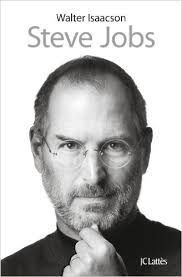
Walter Isaacson – Steve Jobs
haven’t read it yet

Peter Thiel – Zero to One
I’m experiencing this one as an audio book during my daily commute to and from work.
Yes, even I have to work for a living. It uplifts the spirit and all that. I’m a datacenter gangster. Smooth server-criminal. BOFH. Actually, I’m all sorts of things. Aspiring Dr Evil. Bon-vivant extraordinaire. Bit of an ignoramus, really 🙂 But I digress…
This book is Thiel’s notes on startups, paradoxes of entrenched conservative thinking that dominated the tech industry thus-far, and trends going forward.
It’s obvious that the level at which people of his caliber play at – is something to be aspired towards, if not at least taken to heart, because he makes very astute observations about what the future will look like.
I for one am sold…
(will update when finished)
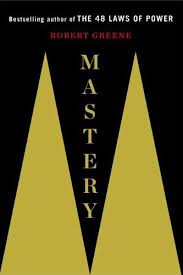
Robert Greene – Mastery
haven’t read it yet
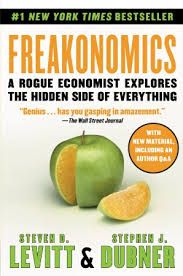
Steven D. Levitt – Freakonomics
read only partially, will update when finished

Malcolm Gladwell – Outliers
haven’t read it yet
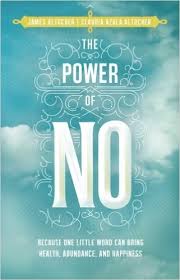
James Altucher, Claudia Azula Altucher – The power of NO
Sometimes it’s best to say NO to things that will otherwise cut into your time that would be dedicated to other YESes
This is a very easy to digest chunk of advice and set of stories, and it definitely shifts fits into the whole message of ‘choosing oneself’ over trying to satisfy everybody.
Good read, albeit it’s arguably a bit inexperienced as far as writing style goes.
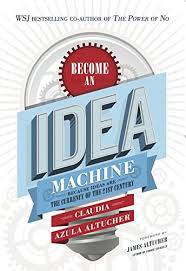
Claudia Azula Altucher – The idea machine
One of the excellent books I’m looking forward to reread. Particularly because it’s a highly interactive book, with 180 prompts, or themes, and blank pages for making lists.
Yes, it’s designed for you to actually write down on the blank pages.
Executive summary: this century’s currency is … ideas. I must become an idea machine in order to simply create ‘magic’. I had begun for a while, but failed miserably at keeping at it.
Personal experience with this book, it’s freakishly effective. Life changing to say the least. Because generating ideas, and being creative in general is one of the necessities that tie into the self-affirmation need we all have.
Read it. Now! Do the exercises therein, and watch the magic happening before your eyes. You’ll want to let me know what your mileage with this was, after you’re done…
P.S> you’re welcome!
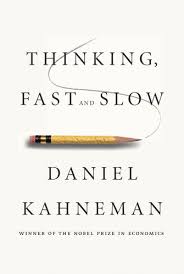
Daniel Kahneman – Thinking Fast and Slow
This work is about irrationality and the deep meanders of human psychology. Biases, cognition, decision making, and all the great ingredients of a work designed to expose the innate flaws of the human condition. But moreover, how to overcome these limitations and become almost superhuman.
A book by a Nobel laureate. Standard reading for aficionados, students of psychology and behavioral science.

